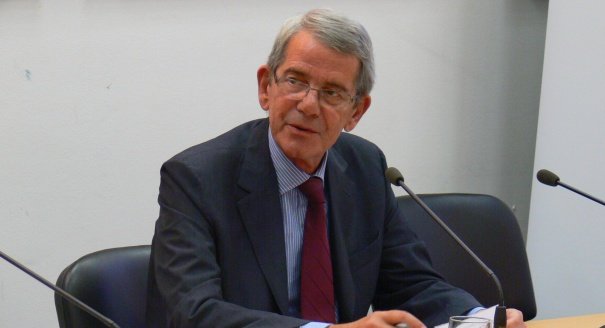Registration
Thank you!
You will receive an email confirming your registration.
IMGXYZ3803IMGZYXThe current economic crisis presents Europe with serious challenges, but also with the opportunity for reflection and change. During an event at the Carnegie Moscow Center, Jean-Claude Thébault, director general of the European Commission’s Bureau of European Policy Advisers (BEPA), discussed the future of the EU and EU-Russian relations at this crucial moment. Carnegie Moscow Center’s Dmitri Trenin moderated.
The Global Context
- A Changing World: According to Thébault, the world is undergoing a “fundamental transformation” characterized by a reconfiguration of power. With the rise of new regional players, the world is becoming increasingly multipolar. International organizations, corporations, and civil society are also gaining importance, even as there is increasing global concern over the scarcity of natural resources.
- The EU: In the context of these global changes, the EU is becoming increasingly relevant, Thébault asserted. It is already a key player on the global stage, and its central values—human and civil rights, the rule of law, and democracy, for example—are now more widely embraced. Thébault predicted that globalization and multipolarity will drive Europe to integrate more deeply, as individual nations realize they cannot promote their interests alone.
- A Global Crisis: Thébault emphasized that, despite the recent focus on the EU, the current economic crisis is truly global. Specifically, Thébault observed, it is a crisis of developed countries whose economic and social structures are insufficiently and unsustainably adjusted to the changing world. The problems the EU faces, including decreasing competitiveness, institutional stalemate, and the rise of populism, are endemic, Thébault said. But he also pointed out the potential for other ongoing geopolitical events, such as the change in Chinese leadership, the civil society movement in Russia, and the Arab Spring, to spark new crises.
- Foundations for Successful Nations: Coexistence, integration in the global economy, and effective government are fundamental for successful nations, Thébault said, adding that a country’s failure to meet any one of these criterion could have harmful and widespread consequences.
The Euro Crisis
- A Correct Diagnosis: An accurate diagnosis of the problem is essential for solving the EU’s many problems, Thébault stated. He pinpointed the lack of competitiveness and integration in some European countries, rather than monetary policy, as the major ailment. Complicating any correctional measures will be the generation shift Europe is experiencing.
- EU Transformation: Thébault argued that the EU will emerge from the crises forever changed. Determined to preserve its union, Europe will need to accept serious reforms. The result, Thébault said, will be integration.
- Long-Term Solutions: Solving the economic crisis will be a long process requiring long-term solutions, Thébault confirmed. He explained that the EU has always had acted with thoroughness, and in the last three years many economic reforms have been implemented successfully. Thébault asserted that growth remains the primary concern. At the end of June, the European Council will focus on this issue, he added.
- The Systemic Dimension: Thébault suggested that the G20 and other international organizations should tackle the systemic dimension of the crises. One example of such action is the EU-Russia effort to prepare the IMF to act as a “firewall” during future crises.
EU-Russia Relations
- Challenging but Vital: Though EU-Russia relations have often been strained, Thébault observed, cooperation remains extremely important. The EU and Russia have significant economic and political incentives for improving relations. To achieve this, Thébault suggested it is key to develop a shared vision with sustainable and mutually beneficial goals. Concrete steps, such as Russia’s accession to the WTO, will pave the way to long-term success, he added.
- A New Beginning: Trenin concluded that EU-Russia relations have not been approached strategically. Perhaps now that the Russian elections and euro crisis are past, the opportunity for a new beginning will present itself, Trenin said.
